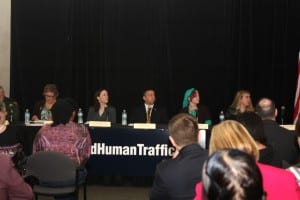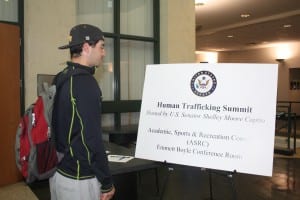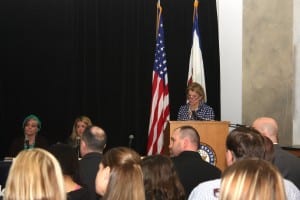WASHINGTON, D.C. – U.S. Senator Shelley Moore Capito (R-W.Va.) hosted a human trafficking summit Wednesday, April 8, 2015 at West Liberty University to discuss solutions for ending human trafficking. The 10 a.m. panel discussion was held in Boyle Conference Center and was open to students. It was mostly attended by area agencies that serve the public in social work fields, domestic violence shelters and members of law enforcement.
According to Sen. Capito’s office, last year, then Congresswoman Capito hosted a forum at West Virginia State University to begin laying the groundwork necessary to combat human trafficking in West Virginia. Since then, the number of suspected human trafficking incidents reported to the National Human Trafficking Resource Center has decreased from 50 phone calls in 2013 to 39 phone calls in 2014. Today’s summit continued this conversation, and featured testimony from law enforcement, academics and a trafficking survivor.
Ahead of today’s event, Senator Capito penned an op-ed, “Battling Human Trafficking,” in The Intelligencer/Wheeling News-Register. Read it here.
Senator Capito’s opening remarks as prepared for delivery stated:
“Thank you West Liberty University for hosting us today. We are here to discuss the very serious crime of human trafficking. Last year, I hosted a summit at West Virginia State University to discuss how we can combat human trafficking. The event brought together many important stakeholders from the law enforcement, advocate and academic communities. Since last year’s summit, the number of suspected human trafficking incidents reported to the National Human Trafficking Resource Center has decreased from 50 phone calls in 2013 to 39 phone calls in 2014. While this progress is encouraging. There is more work to be done. As a mother and a grandmother, this issue hits close to home. When I began to learn more about human trafficking and saw the statistics, I was shocked that this horrific industry was making a fortune right here in our own backyard. It is not just occurring in other countries and on other continents. It is happening right here in our country. The horrible crime of human trafficking impacts thousands of Americans – mostly women and children – each year. It occurs in cities, suburbs and rural towns.
In the United States alone, human trafficking rakes in an astounding $9.8 billion from the use and abuse of victims, many of whom are children. The National Center for Missing and Exploited Children estimates that 100,000 children a year are falling victim to this vile industry within our own borders. While not in large numbers, trafficking occurs in West Virginia’s small communities and towns. In our hotels and at our truck stops. At our schools and online. Several things contribute to trafficking in the Mountain State – our interstates, high poverty and unemployment rates, and the drug epidemic to name a few. Congress is working to combat this crime and give a voice to those whose voices have been silenced. While in the House of Representatives last year, I joined my colleagues to support several bills that address human trafficking. These bills would:
Monitor sex offenders that travel in and out of the United States;
- Provide more funding and support for victims’ rehabilitation;
- Protect those in foster care that are more vulnerable to becoming victims; and
- Prevent online promotion and exploitation and encourage laws that treat minors as victims, not criminals
As a U.S. Senator, I have co-sponsored three additional pieces of legislation to continue fighting against this scourge. One of these bills, The Justice for Victims of Trafficking Act, is a bipartisan piece of legislation that will make it easier for law enforcement to identify and address patterns of human trafficking. The bill takes a needed two-prong approach. It bolsters the tools available to law enforcement to crack down on human traffickers. And helps victims restore their lives through increased federal resources.
For example, this bill creates a Domestic Trafficking Victims’ Fund that the Attorney General can use to fund victims’ support programs for human trafficking and child pornography survivors. This fund is deficit-neutral and financed through fines on persons convicted of child pornography, human trafficking, child prostitution, sexual exploitation, and human smuggling offenses.
The bill also recognizes that child pornography production is a form of human trafficking and allows state and local human trafficking task forces to obtain wiretap warrants within their own state courts without federal approval in order to investigate crimes of child pornography.

Panel participants from left, Lt. Daniel Swiger, Dr. Sylvia Senften, Dr. Jennifer Storer, Brian Morris, Anna Borsick and Tara Tighe.
This bill has gone through a very transparent process. It was carefully considered and unanimously approved in the Senate Judiciary Committee. And, it has been available for every Senator and member of the public to read for months. Although this bill has been held up by Senate Democrats, it has widespread support from 200 advocacy groups, including the NAACP, National Center for Missing and Exploited Children, Rights 4 Girls, National Association to Protect Children, Fraternal Order of Police and the National Conference of State Legislatures. I am optimistic that when the Senate returns next week, we will come together to pass this important legislation.
We need to care for our sons, our daughters and our neighbors – and keep our eyes and ears open.”
Senator Capito moderated a panel at the summit featuring: Tara Tighe, Assistant United States Attorney, United States Attorney’s Office Northern District of West Virginia; Anna Borsick, a survivor of human trafficking; Brian Morris, Department of Homeland Security, ICE Division; Dr. Jennifer Storer, Ph.D., Psychologist, KVC West Virginia; Sylvia Senften, Professor of Social Work, West Liberty University; and Lieutenant Daniel Swiger, West Virginia State Police, Crimes Against Children.
The post U.S. Sen. Shelley Moore Capito Hosts Human Trafficking Summit on Campus appeared first on News & Media Relations.
The post U.S. Sen. Shelley Moore Capito Hosts Human Trafficking Summit on Campus appeared first on Academics.

